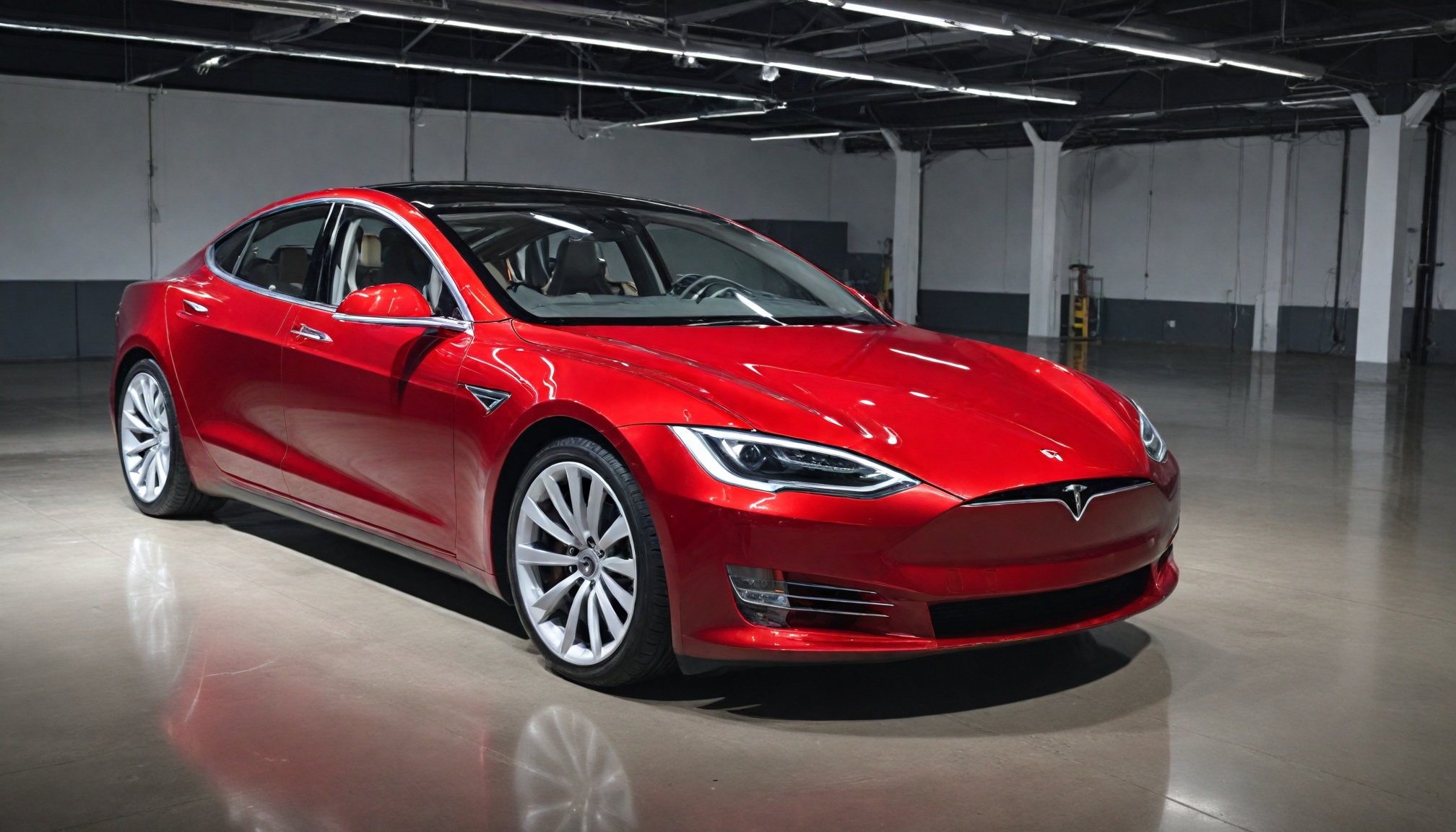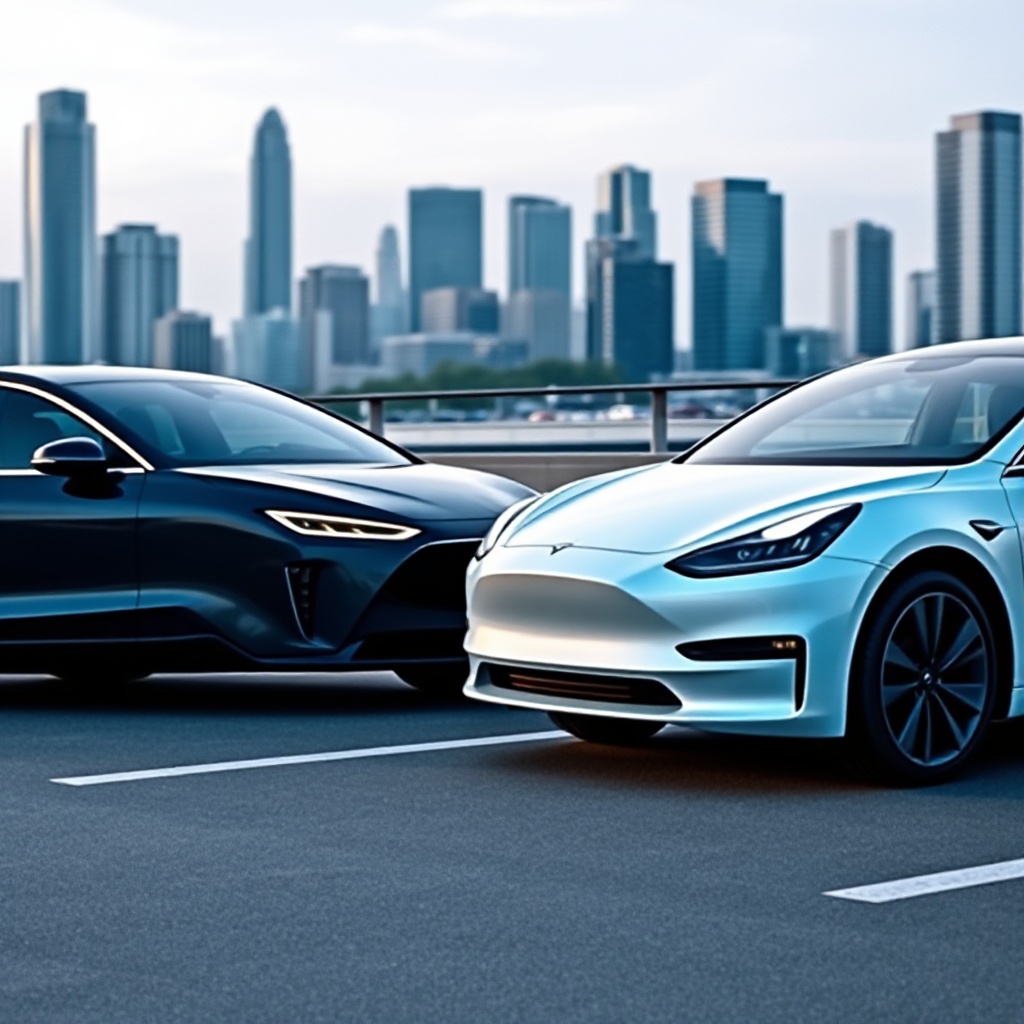
Tesla's EV dominance erodes with 13% global sales drop as BYD, VinFast, and legacy automakers gain ground in an increasingly competitive electric vehicle market.

Drivetech Partners
Tesla's long-held dominance in the electric vehicle market is visibly eroding as Q1 2025 sales figures reveal a dramatic 13% global decline while competitors gain significant ground. The electric vehicle landscape is rapidly transforming from a Tesla-led monopoly into a dynamic battlefield where Chinese manufacturers like BYD, Vietnamese newcomer VinFast, and resurgent legacy automakers are redefining industry standards and consumer expectations.
Key Takeaways
Tesla's sales plummeted 37% in Europe during Q1 2025 while the overall European EV market grew by nearly 30%
BYD has narrowed the gap with Tesla to just 20,000 vehicles in Q3 2024 and overtook Tesla as the top BEV maker in late 2023
VinFast has emerged as the third most valuable EV manufacturer globally with an $85 billion market capitalization
General Motors gained 11% market share in the US after 94% year-over-year sales growth in Q1 2025
The global EV market is shifting from Tesla dominance to a diverse competitive landscape with regional leaders emerging
Tesla's Steep Market Decline Signals End of EV Monopoly
Tesla's market position is deteriorating at an alarming rate. Global sales tumbled 13% in Q1 2025, with the company delivering only 337,000 vehicles – its lowest quarterly sales volume since 2022. The decline is particularly severe in Europe, where Tesla's sales plummeted 37% in Q1 2025 compared to the same period in 2024.
Country-specific figures paint an even bleaker picture, with April sales falling 59% year-over-year in France, 67% in Denmark, and 47% in Portugal. This European sales collapse is especially concerning as it occurred while the overall European electric car market grew by nearly 30%.
In the United States, Tesla's once-dominant market share has eroded from 51% to 44% over the past year, with Q1 2025 sales down 8.6% compared to Q1 2024. The quarter-to-quarter decline globally is even more dramatic at 32%, dropping from 495,570 vehicles in Q4 2024 to just 336,681 in Q1 2025.
Financial indicators are equally troubling. Tesla's operational margin dropped significantly to 8.2% in Q4 2023 from 16% in Q4 2022, while net profits have plummeted by 71% as overall sales dropped by 9% in the most recent quarter.
BYD: The Chinese Giant Dethroning Tesla
While Tesla struggles, Chinese automaker BYD is rapidly closing the competitive gap. In Q3 2024, BYD delivered 443,000 EVs, narrowing the difference with Tesla (463,000) to just 20,000 vehicles. More impressively, BYD overtook Tesla as the world's best-selling battery electric car company in the second half of 2023.

BYD has captured over 20% of global electric car markets when counting both battery electric vehicles (BEV) and plug-in hybrid electric vehicles (PHEV). In its home market, BYD became China's top-selling car company with over 2.4 million new registrations (11% of the domestic market), ending Volkswagen's 15-year leadership position.
The Chinese manufacturer's European expansion is also proving successful, already outselling Tesla in Italy and Spain in Q1 2025 and closing the gap in the UK and Germany. Worldwide sales exceeded 3 million vehicles, making BYD one of the world's top 10 car sellers overall. The company is further cementing its global presence by investing nearly $500 million in Thailand production facilities with an annual capacity of 150,000 vehicles.
VinFast and Rising Asian EV Powers Reshape the Market
Vietnam's VinFast has emerged as a surprising competitive force, becoming the third most valuable electric vehicle maker globally with an $85 billion market cap, just behind BYD's $87 billion. Remarkably, VinFast's market capitalization now exceeds Ford, GM, BMW, Volkswagen, and Mercedes-Benz combined.
Though its production volumes remain modest compared to market leaders, VinFast sold 22,000 EVs in Q3 2024 and is investing approximately $2 billion in US manufacturing. The Vietnamese automaker represents a broader trend of Asian manufacturers disrupting the traditional automotive hierarchy.
Chinese manufacturer Geely sold 197,000 EVs in Q3 2024, surpassing Volkswagen (190,000) to claim the third spot in global EV sales. Other emerging Chinese EV makers gaining ground include XPeng (47,000 units) and Leapmotor (60,000 units) in Q3 2024.
The regional impact is significant. Vietnam's electric car sales exploded from under 100 in 2021 to over 30,000 in 2023, reaching a 15% sales share. Thailand's electric car registrations more than quadrupled year-on-year to nearly 90,000, achieving a 10% sales share in 2023. These figures highlight Southeast Asia's rapid transformation into a significant EV manufacturing hub.
Legacy Automakers Stage a Comeback
Traditional automakers are finally finding their footing in the EV market. General Motors has gained 11% market share in the US after sales grew an impressive 94% year-over-year in Q1 2025. GM's success stems from launching approximately 12 EVs across its Cadillac, Chevrolet, and GMC brands in the past year.
European legacy manufacturers are also showing renewed strength. Volkswagen doubled its EV sales in Europe in Q1 2025, while BMW reported a 64% rise in fully electric vehicle sales. Stellantis and General Motors tied with 65,000 EVs each in Q3 2024, demonstrating the competitive revival of traditional automakers.
Other established brands are expanding their electric portfolios, including Mercedes-Benz (61,000), Toyota (35,000), Ford (32,000), Honda, Renault, and Nissan (approximately 20,000 each). This resurgence happens amid overall market growth, with the EV market in the US expanding by 11% in Q1 2025 to nearly 300,000 cars sold.
Tesla's Self-Inflicted Wounds
Tesla's challenges stem partly from factors within its control. Elon Musk's controversial public image and political entanglements have reportedly eroded sales demand by approximately 10% in key markets. The company also faces a significant talent drain with high-profile executive departures undermining operational stability.
Product stagnation is another critical issue. Tesla's aging product lineup, with no major new vehicle models, contrasts sharply with competitors introducing fresh options. The company blamed the Model Y changeover for lower deliveries in Q1 2025, but sales continued to decline even after production normalized in April.
Tesla's European sales decline of 37% occurred during a period when overall European battery electric car sales surged by 24%, suggesting factors beyond temporary production issues. Operational inefficiencies are also evident in Tesla's margin compression, which fell to 8.2% in Q4 2023 from 16% in Q4 2022.
The New EV Market Dynamics
The global electric vehicle landscape has fundamentally changed. BYD and Tesla together hold 35% of the global EV market, more than all major non-Chinese carmakers combined (30%). However, legacy automakers' global EV market share has declined from 55% in 2015 despite recent product launches.
Chinese manufacturers now control just under 30% of the global EV market, and price competition is intensifying as more affordable EV options enter various markets. The global landscape is shifting from a Tesla-dominated market to a diverse competitive environment with distinct regional patterns.
These regional market strengths are becoming more defined: BYD dominates in Asia, Tesla struggles to maintain its position in Europe, and GM is gaining ground in North America. Meanwhile, Vietnam and Thailand are emerging as significant EV manufacturing hubs in Southeast Asia, further diversifying the global supply chain.
The Future Battleground: Technology vs. Affordability
Looking ahead, the competitive landscape will likely be shaped by two primary factors: technological innovation and affordability. Traditional automakers are focusing on reliability and familiar user experiences while scaling up EV production. Their established manufacturing expertise and brand loyalty provide advantages as they transition their product lines.
Chinese manufacturers are leveraging cost advantages to offer competitive pricing on feature-rich vehicles. BYD's vertical integration, including battery production, enables better margin management than many competitors, allowing it to remain profitable even at lower price points.
Technological innovation, once Tesla's clear domain, is now distributed across a broader competitive landscape. Design diversity is expanding as multiple manufacturers target different market segments with specialized offerings. Charging infrastructure development is becoming a competitive advantage for manufacturers who can provide comprehensive ecosystems.
Regional production strategies are increasingly crucial for market penetration amid growing trade tensions. Companies that can establish manufacturing presence in multiple markets will have significant advantages in navigating tariffs and regulatory requirements while maintaining cost competitiveness.
The electric vehicle market has evolved from Tesla's near-monopoly to a vibrant, competitive landscape with multiple players driving innovation and growth. This transformation benefits consumers through greater choice, competitive pricing, and accelerated technological development – even as it challenges Tesla's once-unassailable market position.
Sources
electrek.co - Tesla sales continue to crash in Europe despite new Model Y
businessinsider.com - Tesla sales slump automakers winning GM VW BYD
visualcapitalist.com - Charted: Tesla's 2025 sales slump
iea.org - Global EV Outlook 2024: Trends in the electric vehicle industry
moomoo.com - VinFast becomes 3rd biggest EV maker globally closing up BYD
opentools.ai - Tesla's rocky road: Sales and profits plummet amidst


